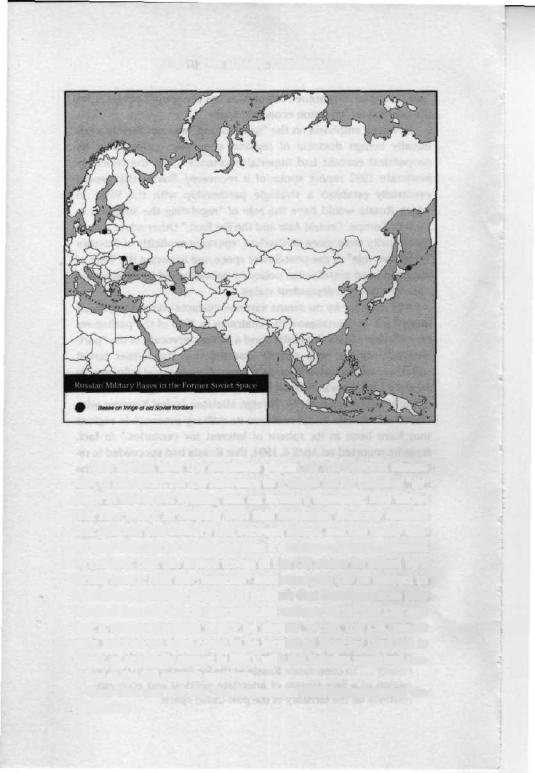
Grand_Chessboard
.pdf
THE BLACK HOLE 103
mestic supporters. Their increasingly shrill and occasionally threatening reactions to the aspirations of the Central Europeans merely intensified the determination of the former satellite states—mindful of their only recently achieved liberation from Russian rule—to gain the safe haven of NATO.
The gulf between Washington and Moscow was widened further by the Kremlin's unwillingness to disavow all of Stalin's conquests. Western public opinion, especially in Scandinavia but also in the United States, was especially troubled by the ambiguity of the Russian attitude toward the Baltic republics. While recognizing their independence and not pressing for their membership in the CIS, even the democratic Russian leaders periodically resorted to threats in order to obtain preferential treatment for the large communities of Russian colonists who had deliberately been settled in these countries during the Stalinist years. The atmosphere was further clouded by the pointed unwillingness of the Kremlin to denounce the secret Nazi-Soviet agreement of 1939 that had paved the way for the forcible incorporation of these republics into the Soviet Union. Even five years after the Soviet Union's collapse, spokesmen for the Kremlin insisted (in the official statement of September 10, 1996) that in 1940 the Baltic states had voluntarily "joined" the Soviet Union.
The post-Soviet Russian elite had apparently also expected that the West would aid in, or at least not impede, the restoration of a central Russian role in the post-Soviet space. They thus resented the West's willingness to help the newly independent postSoviet states consolidate their separate political existence. Even while warning that a "confrontation with the United States ... is an option that should be avoided," senior Russian analysts of American foreign policy argued (not altogether incorrectly) that the United States was seeking "the reorganization of interstate relations in the whole of Eurasia .. . whereby there was not one sole leading power on the continent but many medium, relatively stable, and moderately strong ones ... but necessarily inferior to the United States in their individual or even collective capabilities."'1
'A. Bogaturov and V. Kremenyuk (both senior scholars in the Institute of the United States and Canada), in "The Americans Themselves Will Never Stop," Nezavisimaya Gazeta, June 28, 1996.

104 THE GRAND CHESSBOARD
In this regard, Ukraine was critical. The growing American inclination, especially by 1994, to assign a high priority to AmericanUkrainian relations and to help Ukraine sustain its new national freedom was viewed by many in Moscow—even by its "westerniz- ers"—as a policy directed at the vital Russian interest in eventually bringing Ukraine back into the common fold. That Ukraine will eventually somehow be "reintegrated" remains an article of faith among many members of the Russian political elite.5 As a result, Russia's geopolitical and historical questioning of Ukraine's separate status collided head-on with the American view that an imperial Russia could not be a democratic Russia.
Additionally, there were purely domestic reasons that a "mature strategic partnership" between two "democracies" proved to be illusory. Russia was just too backward and too devastated by Communist rule to be a viable democratic partner of the United States. That central reality could not be obscured by high-sound- ing rhetoric about partnership. Post-Soviet Russia, moreover, had made only a partial break with the past. Almost all of its "democratic" leaders—even if genuinely disillusioned with the Soviet past— were not only the products of the Soviet system but former senior members of its ruling elite. They were not former dissidents, as in Poland or the Czech Republic. The key institutions of Soviet power—though weakened, demoralized, and corrupted—were still there. Symbolic of that reality and of the lingering hold of the Communist past was the historic centerpiece of Moscow: the continued presence of the Lenin mausoleum. It was as if post-Nazi Germany were governed by former middle-level Nazi "Gauleiters" spouting democratic slogans, with a Hitler mausoleum still standing in the center of Berlin.
Tor example, even Yeltsin's top adviser, Dmitryi Ryurikov, was quoted by Interfax (November 20, 1996) as considering Ukraine to be "a temporary phenomenon," while Moscow's Obshchaya Gazeta (December 10, 1996) reported that "in the foreseeable future events in eastern Ukraine may confront Russia with a very difficult problem. Mass manifestations of discontent... will be accompanied by appeals to Russia, or even demands, to take over the region. Quite a few people in Moscow would be ready to support such plans." Western concerns regarding Russian intentions were certainly not eased by Russian demands for Crimea and Sevastopol, nor by such provocative acts as the deliberate inclusion in late 1996 of Sevastopol in Russian public television's nightly weather forecasts lor Russian cities.

THE BLACK HOLE 105
The political weakness of the new democratic elite was compounded by the very scale of the Russian economic crisis. The need for massive reforms—for the withdrawal of the Russian state from the economy—generated excessive expectations of Western, especially American, aid. Although that aid, especially from Germany and America, gradually did assume large proportions, even under the best of circumstances it still could not prompt a quick economic recovery. The resulting social dissatisfaction provided additional underpinning for a mounting chorus of disappointed critics who alleged that the partnership with the United States was a sham, beneficial to America but damaging to Russia.
In brief, neither the objective nor the subjective preconditions for an effective global partnership existed in the immediate years following the Soviet Union's collapse. The democratic "westernizers" simply wanted too much and could deliver too little. They desired an equal partnership—or, rather, a condominium—with America, a relatively free hand within the CIS, and a geopolitical no-man's-land in Central Europe. Yet their ambivalence about Soviet history, their lack of realism regarding global power, the depth of the economic crisis, and the absence of widespread social support meant that they could not deliver the stable and truly democratic Russia that the concept of equal partnership implied. Russia first had to go through a prolonged process of political reform, an equally long process of democratic stabilization, and an even longer process of socioeconomic modernization and then manage a deeper shift from an imperial to a national mindset regarding the new geopolitical realities not only in Central Europe but especially within the former Russian Empire before a real partnership with America could become a viable geopolitical option.
Under these circumstances, it is not surprising that the "near abroad" priority became both the major critique of the pro-West option as well as an early foreign policy alternative. It was based on the argument that the "partnership" concept slighted what ought to be most important to Russia: namely, its relations with the former Soviet republics. The "near abroad" came to be the shorthand formulation for advocacy of a policy that would place primary emphasis on the need to reconstruct some sort of a viable framework, with Moscow as the decision-making center, in the geopolitical space once occupied by the Soviet Union. On this

106 THE GRAND CHESSBOARD
premise, there was widespread agreement that a policy of concentration on the West, especially on America, was yielding little and costing too much. It simply made it easier for the West to exploit the opportunities created by the Soviet Union's collapse.
However, the "near abroad" school of thought was a broad umbrella under which several varying geopolitical conceptions could cluster. It embraced not only the economic functionalists and determinists (including some "westernizers") who believed that the CIS could evolve into a Moscow-led version of the EU but also others who saw in economic integration merely one of several tools of imperial restoration that could operate either under the CIS umbrella or through special arrangements (formulated in 1996) between Russia and Belarus or among Russia, Belarus, Kazakstan, and Kyrgyzstan; it also included Slavophile romantics who advocated a Slavic Union of Russia, Ukraine, and Belarus, and, finally, proponents of the somewhat mystical notion of Eurasianism as the substantive definition of Russia's enduring historical mission.
In its narrowest form, the "near abroad" priority involved the perfectly reasonable proposition that Russia must first concentrate on relations with the newly independent states, especially as all of them remained tied to Russia by the realities of the deliberately fostered Soviet policy of promoting economic interdependence among them. That made both economic and geopolitical sense. The "common economic space," of which the new Russian leaders spoke often, was a reality that could not be ignored by the leaders of the newly independent states. Cooperation, and even some integration, was an economic necessity. Thus, it was not only normal but desirable to promote joint CIS institutions in order to reverse the economic disruptions and fragmentation produced by the political breakup of the Soviet Union.
For some Russians, the promotion of economic integration was thus a functionally effective and politically responsible reaction to what had transpired. The analogy with the EU was often cited as pertinent to the post-Soviet situation. A restoration of the empire was explicitly rejected by the more moderate advocates of economic integration. For example, an influential report entitled "A Strategy for Russia," which was issued as early as August 1992 by the Council for Foreign and Defense Policy, a group of prominent personalities and government officials, very pointedly advocated

THE BLACK HOLE 107
"post-imperial enlightened integration" as the proper program for the post-Soviet "common economic space."
However, emphasis on the "near abroad" was not merely a politically benign doctrine of regional economic cooperation. Its geopolitical content had imperial overtones. Even the relatively moderate 1992 report spoke of a recovered Russia that would eventually establish a strategic partnership with the West, in which Russia would have the role of "regulating the situation in Eastern Europe, Central Asia and the Far East." Other advocates of this priority were more unabashed, speaking explicitly of Russia's "exclusive role" in the post-Soviet space and accusing the West of engaging in an anti-Russian policy by providing aid to Ukraine and the other newly independent states.
A typical but by no means extreme example was the argument made by Y. Ambartsumov, the chairman in 1993 of the parliamentary Foreign Affairs Committee and a former advocate of the "partnership" priority, who openly asserted that the former Soviet space was an exclusive Russian sphere of geopolitical influence. In January 1994, he was echoed by the heretofore energetic advocate of the pro-Western priority, Foreign Minister Andrei Kozyrev, who stated that Russia "must preserve its military presence in regions that have been in its sphere of interest for centuries." In fact, Izvestiia reported on April 8,1994, that Russia had succeeded in retaining no fewer than twenty-eight military bases on the soil of the newly independent states—and a line drawn on a map linking the Russian military deployments in Kaliningrad, Moldova, Crimea, Armenia, Tajikistan, and the Kuril Islands would roughly approximate the outer limits of the former Soviet Union, as in the map on page 108.
In September 1995, President Yeltsin issued an official document on Russian policy toward the CIS that codified Russian goals as follows:
The main objective of Russia's policy toward the CIS is to create an economically and politically integrated association of states capable of claiming its proper place in the world community ... to consolidate Russia as the leading force in the formation of a new system of interstate political and economic relations on the territory of the post-Union space.

108 THE GRAND CHESSBOARD
One should note the emphasis placed on the political dimension of the effort, on the reference to a single entity claiming "its" place in the world system, and on Russia's dominant role within that new entity. In keeping with this emphasis, Moscow insisted that political and military ties between Russia and the newly constituted CIS also be reinforced: that a common military command be created; that the armed forces of the CIS states be linked by a formal treaty; that the "external" borders of the CIS be subject to centralized (meaning Moscow's) control; that Russian forces play the decisive role in any peacekeeping actions within the CIS; and that a common foreign policy be shaped within the CIS, whose main institutions have come to be located in Moscow (and not in Minsk, as originally agreed in 1991), with the Russian president presiding at the CIS summit meetings.
And that was not all. The September 1995 document also declared that

THE BLACK HOLE 109
Russian television and radio broadcasting in the near abroad should be guaranteed, the dissemination of Russian press in the region should be supported, and Russia should train national cadres for CIS states.
Special attention should be given to restoring Russia's position as the main educational center on the territory of the post-Soviet space, bearing in mind the need to educate the young generation in CIS states in a spirit of friendly relations with Russia.
Reflecting this mood, in early 1996 the Russian Duma went so far as to declare the dissolution of the Soviet Union to be invalid. Moreover, during spring of the same year, Russia signed two agreements providing for closer economic and political integration between Russia and the more accommodating members of the CIS. One agreement, signed with great pomp and circumstance, in effect provided for a union between Russia and Belarus within a new "Community of Sovereign Republics" (the Russian abbreviation "SSR" was pointedly reminiscent of the Soviet Union's "SSSR"), and the other—signed by Russia, Kazakstan, Belarus, and Kyrgyzs- tan—postulated the creation in the long term of a "Community of Integrated States." Both initiatives indicated impatience over the slow progress of integration within the CIS and Russia's determination to persist in promoting it.
The "near abroad" emphasis on enhancing the central mechanisms of the CIS thus combined some elements of reliance on objective economic determinism with a strong dose of subjective imperial determination. But neither provided a more philosophical and also a geopolitical answer to the still gnawing question "What is Russia, what is its true mission and rightful scope?"
It was this void that the increasingly appealing doctrine of Eurasianism—with its focus also on the "near abroad"—attempted to fill. The point of departure for this orientation—defined in rather cultural and even mystical terminology—was the premise that geopolitically and culturally, Russia is neither quite European nor quite Asian and that, therefore, it has a distinctive Eurasian identity of its own. That identity is the legacy of Russia's unique spatial control over the enormous landmass between Central Europe and the shores of the Pacific Ocean, the legacy of the imperial statehood that Moscow forged through four centuries of eastward

110 THE GRAND CHESSBOARD
expansion. That expansion assimilated into Russia a large nonRussian and non-European population, creating thereby also a singular Eurasian political and cultural personality.
Eurasianism as a doctrine was not a post-Soviet emanation. It first surfaced in the nineteenth century but became more pervasive in the twentieth, as an articulate alternative to Soviet communism and as a reaction to the alleged decadence of the West. Russian Emigres were especially active in propagating the doctrine as an alternative to Sovietism, realizing that the national awakening of the non-Russians within the Soviet Union required an overarching supranational doctrine, lest the eventual fall of communism lead also to the disintegration of the old Great Russian Empire.
As early as the mid-1920s, this case was articulated persuasively by Prince N. S. Trubetzkoy, a leading exponent of Eurasianism, who wrote that
[c]ommunism was in fact a disguised version of Europeanism in destroying the spiritual foundations and national uniqueness of Russian life, in propagating there the materialist frame of reference that actually governs both Europe and America ...
Our task is to create a completely new culture, our own culture, which will not resemble European civilization ... when Russia ceases to be a distorted reflection of European civilization ... when she becomes once again herself: Russia-Eurasia, the conscious heir to and bearer of the great legacy of Genghis Khan.e
That view found an eager audience in the confused post-Soviet setting. On the one hand, communism was condemned as a betrayal of Russian orthodoxy and of the special, mystical "Russian idea"; and on the other, westernism was repudiated because the West, especially America, was seen as corrupt, anti-Russian culturally, and inclined to deny to Russia its historically and geographically rooted claim to exclusive control over the Eurasian landmass.
Eurasianism was given an academic gloss in the much-quoted writings of Lev Gumilev, a historian, geographer, and ethnogra-
EN. S. Trubetzkoy. "The Legacy of Genghis Khan," Cross Currents 9 (1990):68.

THE BLACK HOLE 111
pher, whose books Medieval Russia and the Great Steppe, The
Rhythms ofEurasia, and The Geography ofEthnos in Historical Time make a powerful case for the proposition that Eurasia is the natural geographic setting for the Russian people's distinctive "ethnos," the consequence of a historic symbiosis between them and the non-Russian inhabitants of the open steppes, creating thereby a unique Eurasian cultural and spiritual identity. Gumilev warned that adaptation to the West would mean nothing less for the Russian people than the loss of their own "ethnos and soul."
These views were echoed, though more primitively, by a variety of Russian nationalist politicians. Yeltsin's former vice president, Aleksandr Rutskoi, for example, asserted that "it is apparent from looking at our country's geopolitical situation that Russia represents the only bridge between Asia and Europe. Whoever becomes the master of this space will become the master of the world."7 Yeltsin's 1996 Communist challenger, Gennadii Zyuganov, despite his Marxist-Leninist vocation, embraced Eurasianism's mystical emphasis on the special spiritual and missionary role of the Russian people in the vast spaces of Eurasia, arguing that Russia was thereby endowed both with a unique cultural vocation and with a specially advantageous geographic basis for the exercise of global leadership.
A more sober and pragmatic version of Eurasianism was also advanced by the leader of Kazakstan, Nursultan Nazarbayev. Faced at home with an almost even demographic split between native Kazaks and Russian settlers and seeking a formula that would somewhat dilute Moscow's pressures for political integration, Nazarbayev propagated the concept of the "Eurasian Union" as an alternative to the faceless and ineffective CIS. Although his version lacked the mystical content of the more traditional Eurasianist thinking and certainly did not posit a special missionary role for the Russians as leaders of Eurasia, it was derived from the notion that Eurasia—denned geographically in terms analogous to that of the Soviet Union—constituted an organic whole, which must also have a political dimension.
To a degree, the attempt to assign to the "near abroad" the highest priority in Russian geopolitical thinking was justified in the
Interviewwith{.'Espresso(Rome),July15,1994.

112 THE GRAND CHESSBOARD
sense that some measure of order and accommodation between postimperial Russia and the newly independent states was an absolute necessity, in terms of security and economics. However, what gave much of the discussion a surrealistic touch was the lingering notion that in some fashion, whether it came about either voluntarily (because of economics) or as a consequence of Russia's eventual recovery of its lost power—not to speak of Russia's special Eurasian or Slavic mission—the political "integration" of the former empire was both desirable and feasible.
In this regard, the frequently invoked comparison with the EU neglects a crucial distinction: the EU, even allowing for Germany's special influence, is not dominated by a single power that alone overshadows all the other members combined, in relative GNP, population, or territory. Nor is the EU the successor to a national empire, with the liberated members deeply suspicious that "integration" is a code word for renewed subordination. Even so, one can easily imagine what the reaction of the European states would have been if Germany had declared formally that its goal was to consolidate and expand its leading role in the EU along the lines of Russia's pronouncement of September 1995 cited earlier.
The analogy with the EU suffers from yet another deficiency. The open and relatively developed Western European economies were ready for democratic integration, and the majority of Western Europeans perceived tangible economic and political benefits in such integration. The poorer West European countries were also able to benefit from substantial subsidies. In contrast, the newly independent states viewed Russia as politically unstable, as still entertaining domineering ambitions, and, economically, as an obstacle to their participation in the global economy and to their access to much-needed foreign investment.
Opposition to Moscow's notions of "integration" was particularly strong in Ukraine. Its leaders quickly recognized that such "integration," especially in light of Russian reservations regarding the legitimacy of Ukrainian independence, would eventually lead to the loss of national sovereignty. Moreover, the heavy-handed Russian treatment of the new Ukrainian state—its unwillingness to grant recognition of Ukraine's borders, its questioning of Ukraine's right to Crimea, its insistence on exclusive extraterritorial control over the port of Sevastopol—gave the aroused Ukrainian national-
